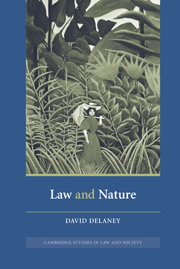Book contents
- Frontmatter
- Contents
- Acknowledgments
- Part I Situating nature
- Part II Rendering nature
- 6 It's a slippery slope: law and the forces of nature
- 7 Doctrinal wilderness and the path of interpretation: law and wilderness
- 8 Wild justice and the endangerment of meaning: law and endangered species
- 9 Puka's choice: law and animal experimentation
- 10 Fear of falling: law and bestiality
- 11 The births of nature and tradition: law and reproductive technologies
- 12 Doctrinal mutations at the edge of meaning: law and genetic screening
- 13 Return of the beast within: law and biological criminal defenses
- 14 Controlling dreams: law and the involuntary medication of prisoners
- Part III Judging nature
- References
- Index
10 - Fear of falling: law and bestiality
Published online by Cambridge University Press: 22 July 2009
- Frontmatter
- Contents
- Acknowledgments
- Part I Situating nature
- Part II Rendering nature
- 6 It's a slippery slope: law and the forces of nature
- 7 Doctrinal wilderness and the path of interpretation: law and wilderness
- 8 Wild justice and the endangerment of meaning: law and endangered species
- 9 Puka's choice: law and animal experimentation
- 10 Fear of falling: law and bestiality
- 11 The births of nature and tradition: law and reproductive technologies
- 12 Doctrinal mutations at the edge of meaning: law and genetic screening
- 13 Return of the beast within: law and biological criminal defenses
- 14 Controlling dreams: law and the involuntary medication of prisoners
- Part III Judging nature
- References
- Index
Summary
INTRODUCTION
I love you, little girl. I'm in love with you. You're so sweet, so funny, so – oh Cherry my darling! He hugged her neck, hard, her head over his shoulder, rubbing his cheek against her sleek coat … James awoke as the sun came peeking over the eastern horizon. He was lying in the soft straw outside the stable, shorts again covering his loins. Cherry was asleep on the ground beside him, the top of her head resting on his left arm. James was happy.
(Mathews 1994, 193)James is the fictionalized name adopted by Mark Mathews, author of the autobiographical book The Horseman: Obsessions of a Zoophile. Mark Mathews is the pseudonym adopted by George Wilbur, an “out” zoophile, founder of Zoophile Outreach Organization and featured subject of both a BBC documentary, Hidden Loves, and an episode of the Jerry Springer show. Cherry, if it isn't obvious, is a horse that James/Mark/George owns. The passage quoted comes at the end of a book in which the narrator recounts his path from self-loathing to self-acceptance. Guided by a sympathetic psychologist, the author comes to realize that he and other members of the zoophile community practice a “nonthreatening alternate behavior.” The aim of the book is to point the way toward greater social acceptance. The author analogizes the struggle of zoophiles to the historical struggles of African-Americans and gays and lesbians. “I am not normal,” he writes.
But we are human beings, sharing most of the characteristics of humanity. As such, rather than forcing us into chemical treatment or imprisoning us, or casting us out, perhaps it is time for society to take a closer look at its attitudes toward us. […]
- Type
- Chapter
- Information
- Law and Nature , pp. 235 - 270Publisher: Cambridge University PressPrint publication year: 2003



